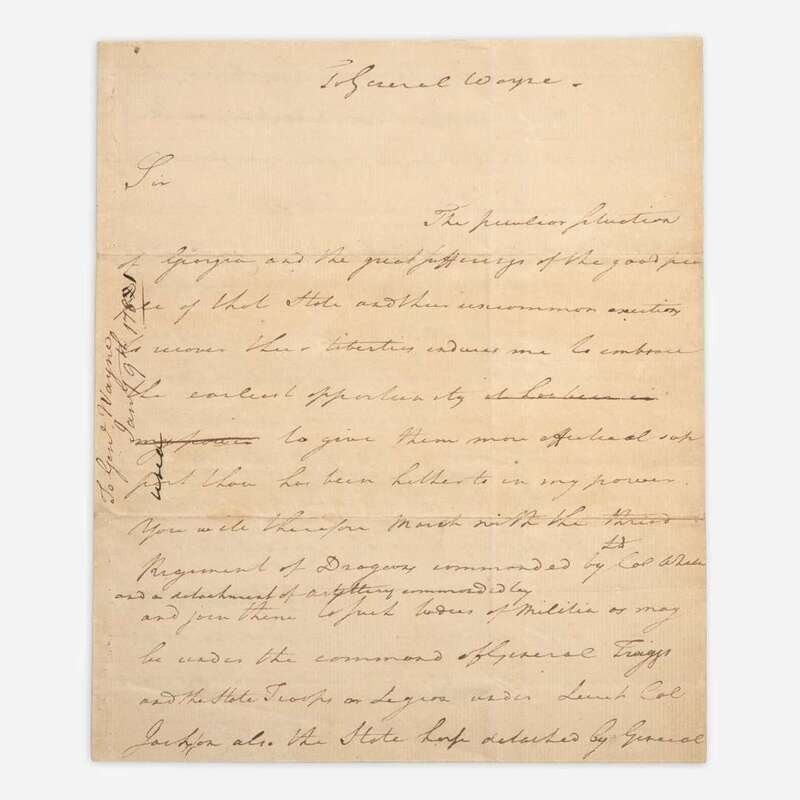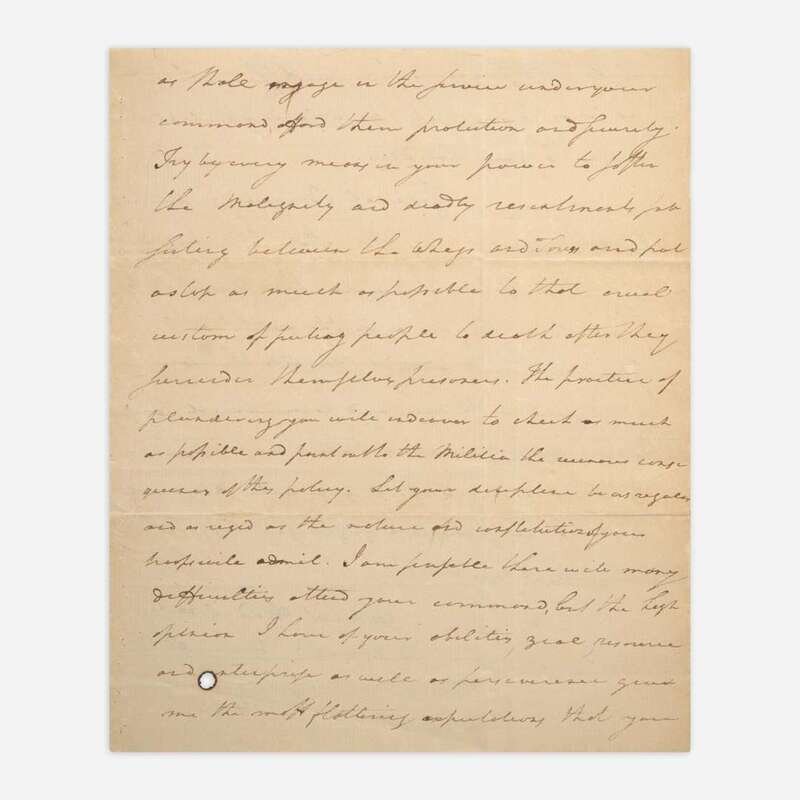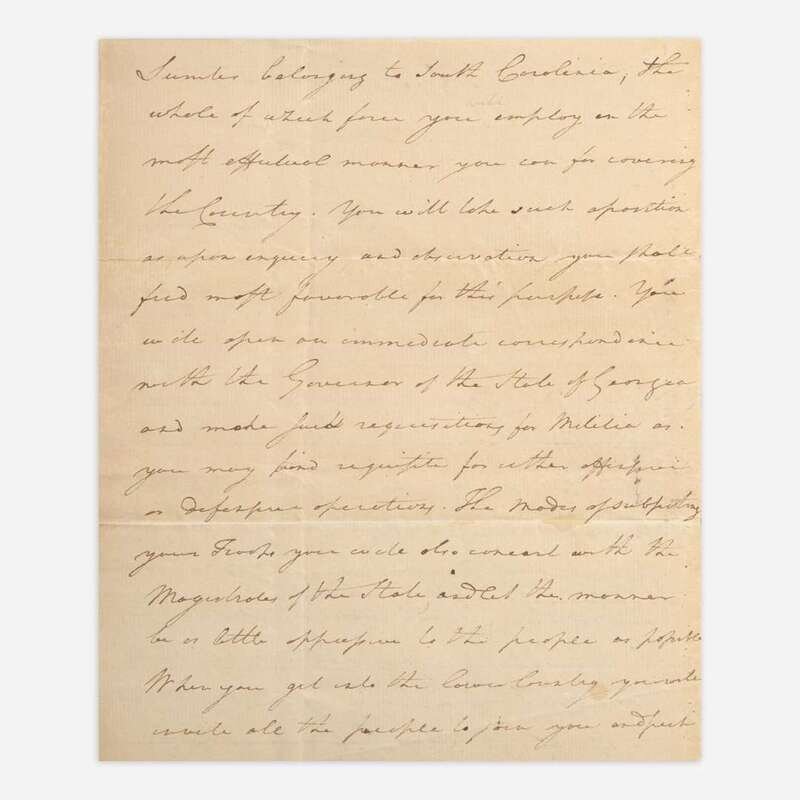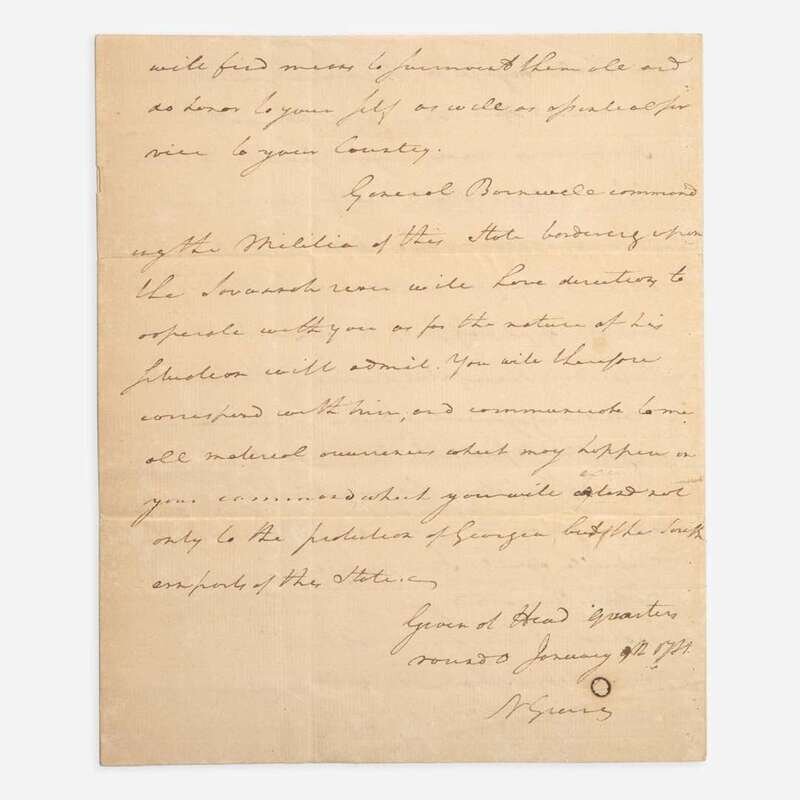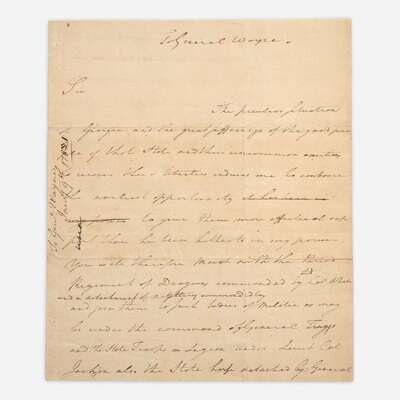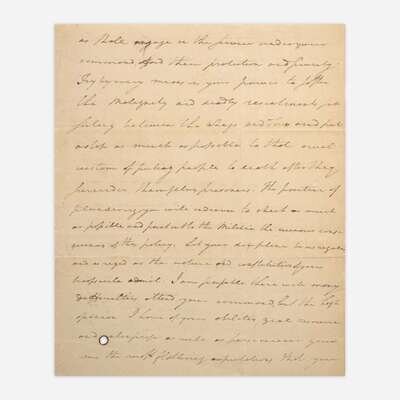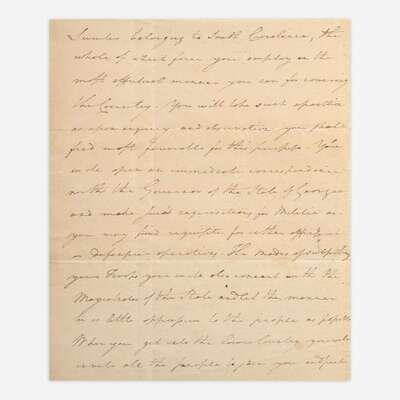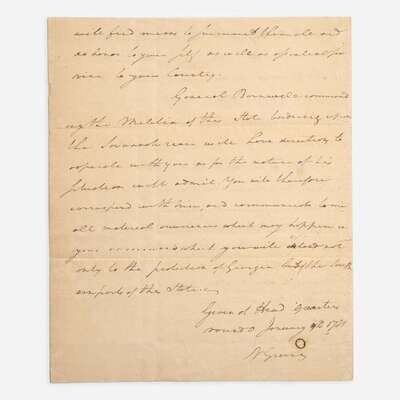Condition Report
Contact Information
Lot 11
Lot Description
Draft of General Anthony Wayne's orders to march on Georgia
"Try by every means in your power to soften the Malignity and deadly resentments subsisting between the Whigs and Tories"
Round O, (South Carolina), January 9, 1781 (but, 1782). One sheet folded to make four pages, 8 15/16 x 7 7/16 in. (227 x 189 mm). Autograph draft letter, signed by Nathanael Greene, to General Anthony Wayne, giving him his orders to march on Georgia and secure it from British occupation; MS. in a different hand along left edge of first page, "To Genl. Wayne/Jany. 9 1782" ("2" in "1782" erroneously crossed out in an additional hand and replaced with "1"; "used" added below in same hand); series of pinholes along left edge presumably from when bound; edges trimmed; creasing from contemporary folds; small contemporary hole above Greene's signature, but not affecting any letters. The finished letter sent to General Wayne is held at the Historical Society of Pennsylvania (in Anthony Wayne Papers, Collection 0699, Volume 14, Page 110), and was published in The Papers of General Nathanael Greene (edited by Dennis M. Conrad, Chapel Hill, The University of North Carolina Press). Lot includes an engraved image of Greene.
Major General Nathanael Greene orders General Anthony Wayne (1745-96) to march on Georgia to retake Savannah from British occupation.
"To General Wayne.
Sir
The peculiar situation of Georgia, and the great sufferings of the good people of that state, and their uncommon exertions to recover their liberties induces me to embrace the earliest opportunity it has been in my power to give them more effectual support than has been hither to in my power. You will therefore March with the third Regiment of Dragoons commanded by Lt. Col. White and a detachment of artillery commanded by and join them to such bodies of Militia as may be under the command of General Twiggs and the State Troops or Legion under Lieut Col Jackson, also the State horse detached by General Sumter belonging to South Carolina, the whole of which force you will employ in the most effectual manner you can for covering the Country. You will take such a position as upon enquiry, and observation, you shall find most favorable for this purpose. You will open an immediate correspondence with the Governor of the State of Georgia and make such requisitions for Militia as you may find requisite for either offensive or defensive operations. The modes of subsisting your Troops you will also concert with the Magistrates of the State, and let the manner be as little oppressive to the people as possible. When you get into the lower Country you will invite all the people to join you and such as Shall engage in the Service under your command, afford them protection and security. Try by every means in your power to soften the Malignity and deadly resentments subsisting between the Whigs and Tories and put a stop as much as possible to that cruel custom of puting (sic) people to death after they surrender themselves prisoners. The practice of plundering you will endeavor to check as much as possible and point out to the Militia the ruinous consequences of this policy. Let your discipline be as regular and rigid as the nature and constitution of your troops will admit. I am sensible there will many difficulties attend your command, but the high opinion I have of your abilities, zeal, resource, and enterprise as well as perseverance gives me the most flattering expectations that you will find means to surmount them all and do honor to your self as well as essential service to your Country.
General Barnwell commanding the Militia of this State bordering upon the Savannah river will have directions to (c)ooperate (sic) with you as far the nature of his situation will admit. You will therefore correspond with him, and communicate to me all material occurrences which may happen in your command, which you will extend not only to the protection of Georgia, but the Southern parts of this State.
Given at Head quarters
round o January 9th 1781
N Greene"
Although the American victory over the British at the Battle of Yorktown, in October 1781, turned the tide of the war and would eventually ensure their independence, by January 1782, the British still controlled important cities in South Carolina and Georgia. Retaking this territory would be key for the Americans to use as leverage during future peace negotiations that would begin in earnest later that summer. Major General Nathanael Greene was already over a year into leading the Continental Army's Southern campaign when he turned to General Anthony Wayne and ordered him to march on Georgia to help retake British-occupied Savannah. Due to the Army's dwindling resources Wayne was given command of only a few hundred soldiers, mostly a mix of Continentals, militiamen, volunteers, and loyalist defectors. Less organized compared to the large British occupying forces garrisoned in the fortified city, Wayne was forced to engage the enemy through a war of attrition in small hit and run skirmishes and nighttime raids throughout the countryside in an effort to disrupt troop movements and break supply lines. Key to this undertaking--as Greene instructs in this letter--was to encourage defections among the enemy ranks, attempt to rally loyalists in the countryside over to the Patriot cause as they moved south, and treat the region's residents with respect, "Try by every means in your power to soften the Malignity and deadly resentments subsisting between the Whigs and Tories." When directing Wayne on these measures, Greene most likely had in mind the excess plundering and violence that pitted neighbor against neighbor, that he had witnessed in the notoriously bloody warfare that took place in the Carolina back country.
Wayne crossed into Georgia ten days following this letter, on January 19, 1782, and connected with troops under the commands of Colonel Anthony White, Captain James Gunn, Captain Archibald Gill, and later General John Barnwell. Over the next six months Wayne's troops and other regiments engaged in numerous skirmishes against loyalists, British regiments, and Native Americans, as they applied a multi-pronged pressure campaign on Savannah, that ultimately resulted in the British surrender on July 11, 1782.
